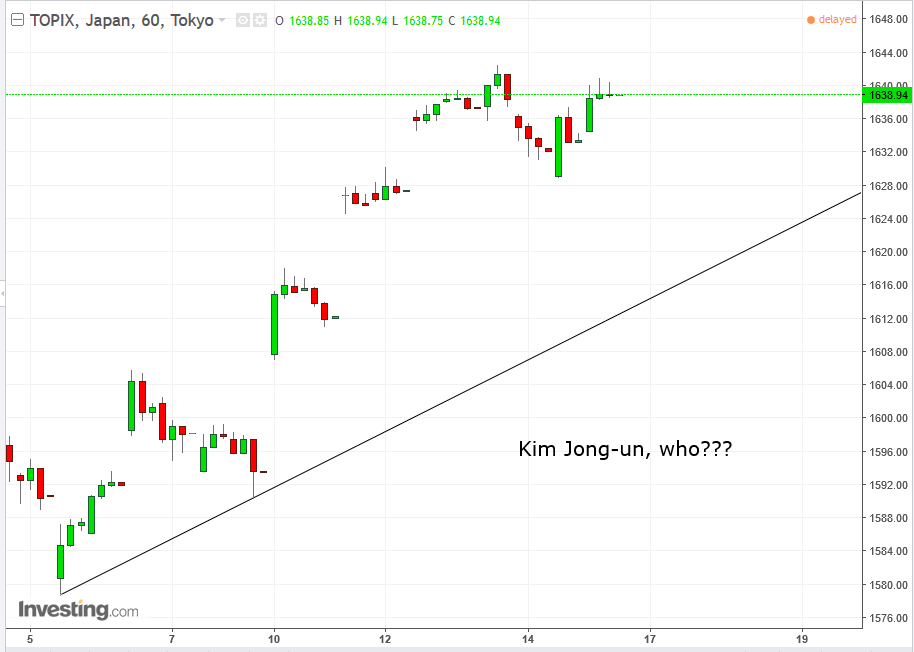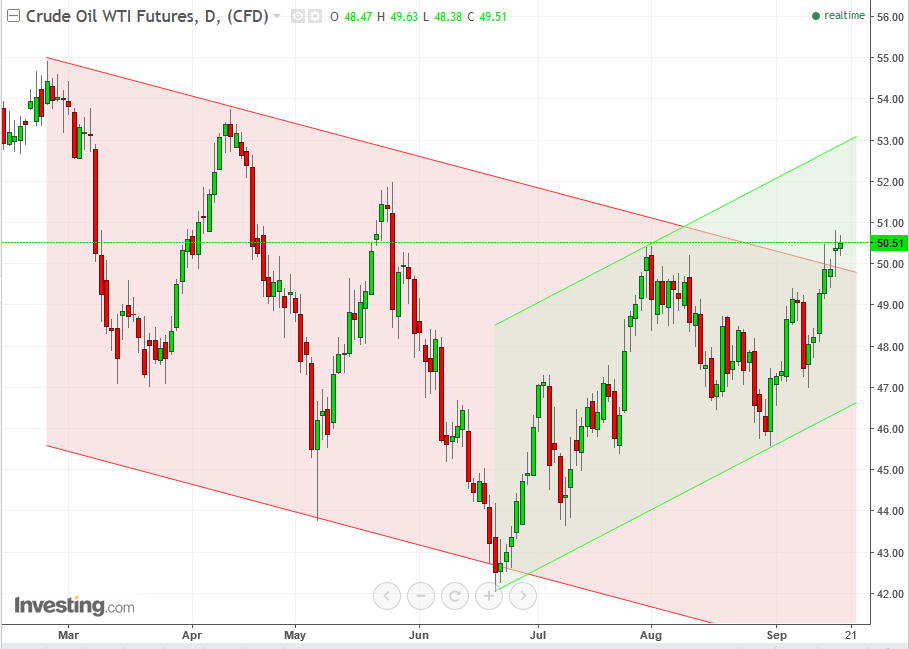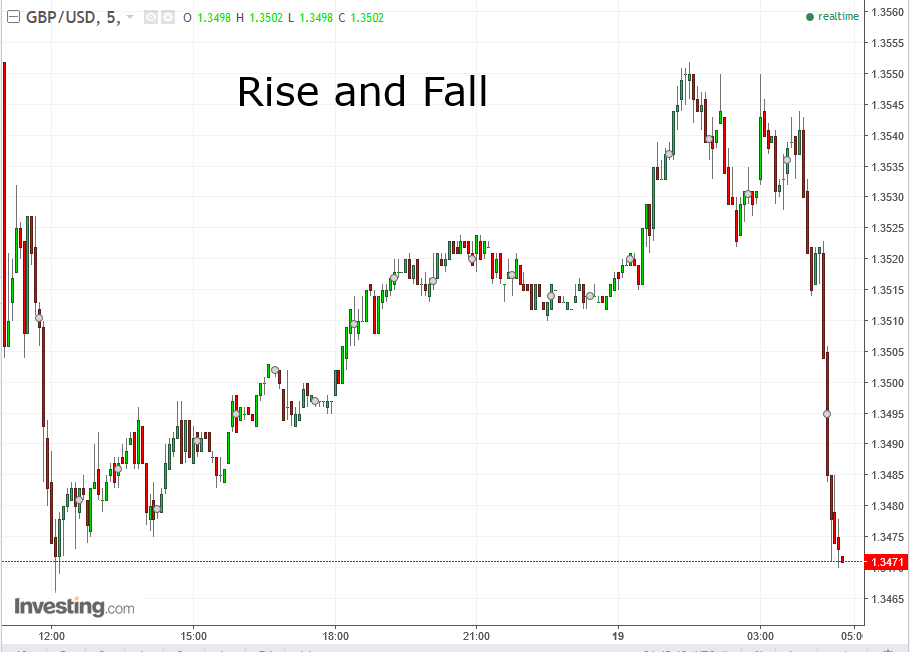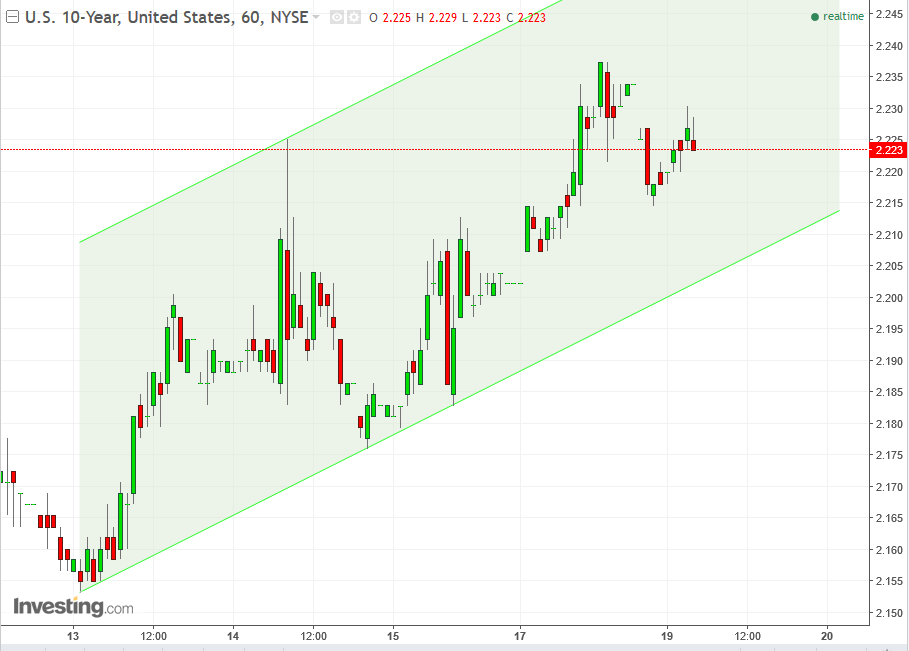by Pinchas Cohen
Key Events
Despite North Korea's second missile launch in the past two-and-a-half weeks, the most recent on Friday September 15, global stocks continue to power through record highs. This, after potent risk-off sentiment appeared to grip markets before North Korea’s “founding day” holiday the previous week when celebratory missile “fireworks” were expected but didn’t materialize.
Even investors in the most exposed markets—such as neighboring South Korea and Japan whose airspace has been violated twice now—continue to bid up equities.

This morning, after Japanese markets reopened post-observance of the country's “Respect for the Aged Day,” holiday, local equity markets—including the TOPIX—played catch-up. Stocks were driven higher by 1 percent to their highest closing prices since August 20, 2015.
Investors remain steadfast about growth assets, as they focus on tomorrow's FOMC meeting, scheduled for 14:00 EDT Wednesday. Though it's expected that interest rates will remain unchanged, consensus forecasts expect an announcement regarding balance sheet tapering, and investors also look forward to guidance as to whether there will be additional rate hikes this year.
Global Financial Affairs
Though investors have largely disregarded geopolitical risk over the long-term, the near-3 percent S&P 500 decline in August, around the time Pyongyang launched its first missile, is testament to the short-term volatility potential that can stop-out many traders. Risk of further market gyration looms when US President Donald Trump addresses the United Nations General Assembly later today, for the first time. As the world's leaders seek a diplomatic solution to Pyongyang’s nuclear ambitions, how might they receive a president who could easily deviate from the script with such pungent terminology as “fire and fury,” someone who both speaks loudly and could be carrying a big stick?
Asian markets finished the day mixed this morning. Japanese investors made up for yesterday’s holiday, even as other Asian-market shares retreated. European shares are currently following Asia down.
Global equities, which are already in unfamiliar territory, are not likely to keep trailblazing higher, at least not until tomorrow, after the Fed provides their next set of clues regarding policy. Then again, the market is an untamable beast that feeds on various and conflicting narratives, such as Europe’s increasing growth, the ups-and-downs of Brexit negotiations and China’s actions to halt any further strengthening of its currency.
Ahead of the Fed, the dollar edged lower, while sterling and the euro jumped. Cables advance was commensurate with trader bets on a BoE interest-rate hike this year. Expectations are rising.

The price of oil hit a brick wall last Thursday at the $50 mark, as it reached the resistance of its downtrend since February, when US output started to stifle OPEC / NOPEC supply curbs. Today, crude is giving the $51 level another go, after a report that the largest US plant operated by Motiva Enterprises and based in Texas has pushed back maintenance from now until April 2018, part of a pattern among oil refineries to milk more fuel from plants now, in order to take advantage of strong margins. Should it close at this level, it will have been the first time since May 24 that the commodity has seen a close above $50, paving the way for another rally.
A Bloomberg survey forecasts US stockpiles to have increased by 3 million barrels last week. Official data will be released tomorrow at 10:30 EDT.
Up Ahead
- Brexit strategy is in focus as Theresa May prepares to outline her revised approach on Friday.
- The Fed’s rate decision is Wednesday, 14:00 EDT.
- The Bank of Japan is predicted to stand pat when it reviews policy Thursday. The BOJ probably won’t reveal when it will unwind stimulus, but could signal determination to keep the yield curve under control.
- Indonesia, the Philippines and South Africa are among countries also reviewing monetary policy this week.
- Home construction and sales of previously owned properties are the highlights of the week’s U.S. economic calendar.
- Campaigning continues in Germany, days before the September 24 election which could see Angela Merkel re-elected as chancellor for a fourth term.
- New Zealand goes to the polls on September 23.
Market Moves
Stocks
- Japan’s TOPIX added 1.8 percent at the close in Tokyo.
- The KOSPI index lost 0.1 percent in Seoul as did Australia’s S&P/ASX 200 Index.
- Hong Kong’s Hang Seng Index dropped 0.3 percent and the Shanghai Composite Index was down 0.2 percent.
- The Stoxx Europe 600 Index decreased 0.2 percent as of 8:33 London time (3:33 EDT).
- The MSCI All-Country World Index rose 0.1 percent to its highest level on record.
- The U.K.’s FTSE 100 gained less than 0.05 percent.
- Germany’s DAX decreased 0.1 percent.
- The MSCI Emerging Markets Index fell 0.3 percent, its largest slide in more than two weeks.
- S&P 500 Futures dipped less than 0.05 percent.
Currencies
- The Bloomberg Dollar Spot Index declined 0.1 percent.
- The euro rose 0.3 percent to $1.1987, the strongest in more than a week.

- The British pound gained 0.3 percent to $1.3529.
- The Japanese yen fell 0.2 percent to 111.79 per dollar, the weakest in eight weeks.
Commodities
- Gold rose less than 0.05 percent to $1,307.58 an ounce.
- West Texas Intermediate crude ticked 0.6 percent higher, to $50.19 a barrel; its seventh consecutive advance.
Bonds

